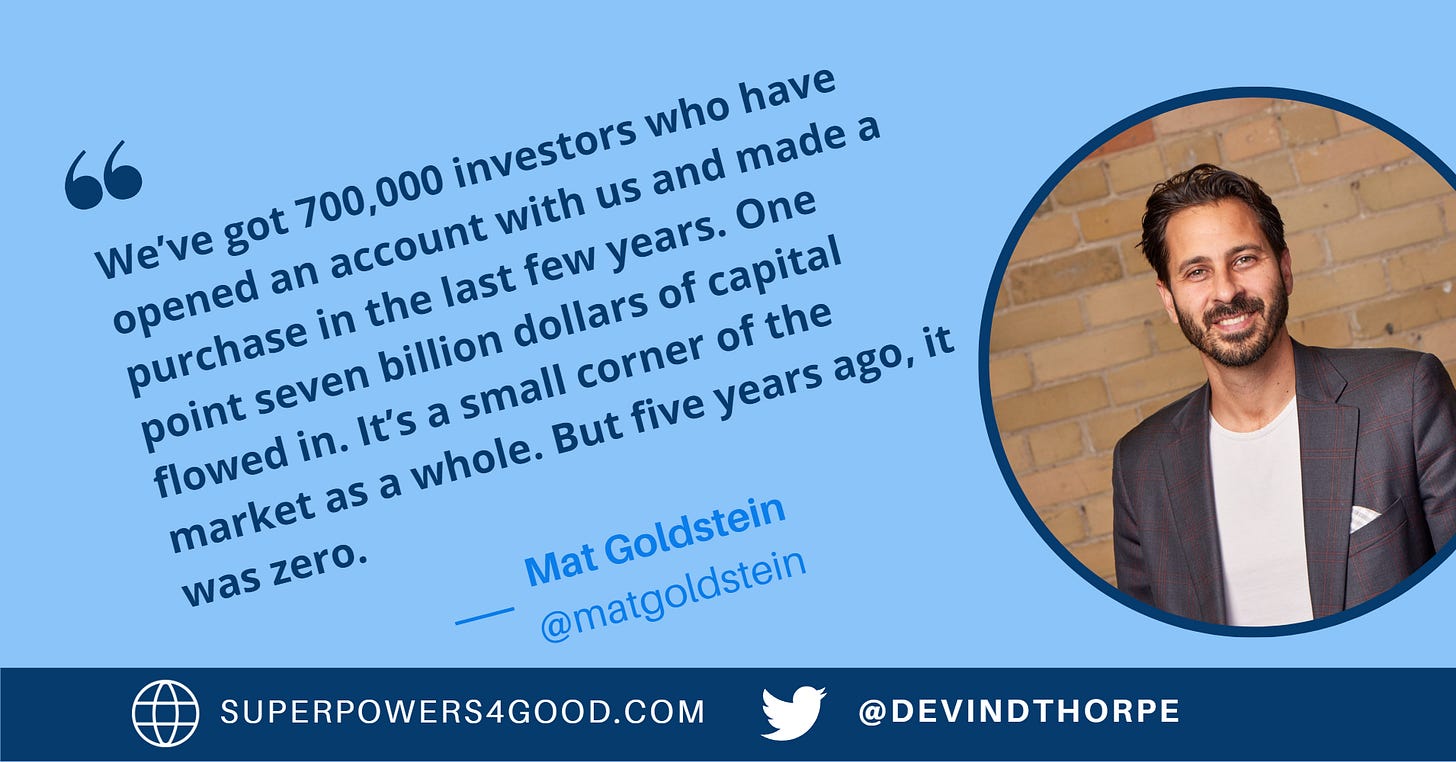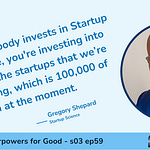We’re thrilled to announce that DealMaker is a gold sponsor for SuperCrowd23!
Devin: What do you see as your superpower?
Mat: There is a continuous learning and growth that I have always identified within me and certainly in my partner as well that we try to bring to the company. It’s a mindset that says every day, I’m going to try to get a little bit better. I think over time, the information we get from the rest of the world, if we’re listening closely, will guide us to being better. Are we serving? Are we serving an important role? Are we doing the best we can? Are we keeping up with the times? We’re giving people what they need. Are we doing what’s valued?
“We’ve got 700,000 investors who have opened an account with us and made a purchase in the last few years,” says Mat Goldstein, co-founder and CSO of DealMaker. “One point seven billion dollars of capital flowed in. It’s a small corner of the market as a whole. But five years ago, it was zero.”
Mat provided an overview of the business and the firm’s target markets. DealMaker supports larger issuers on its own platform through its own broker-dealer and provides technology to crowdfunding portals that typically serve smaller issuers.
Like CEO Rebecca Kacaba, Mat is a securities lawyer. “I started my career in New York on Wall Street, dealing with capital formation, capital raising what we used to call private placements.”
That experience helped them see a future they could shape with technology.
“We’re not talking about the public stock markets where you buy through a brokerage account; we’re talking about private investment opportunities, where people have to be invited to participate and have to be eligible because they’re an accredited investor,” he says.
The pair of lawyers saw the administrative difficulties of dealing with such offerings—lots of paper and associated errors that demanded expensive time to correct. Similarly, they could see how selling clothes and shoes online had seemed impossible only years earlier.
“Bringing technology solutions into the market was the core of our mission,” Mat says. “The sale of securities will go exactly the same way. It will be technology driven.”
“One of our key realizations was if you give people the technology to build a community, they can turn that community into a source of capital.” That profound insight has led to DealMaker’s success, becoming the third fastest-growing company in Canada.
That community-building technology is fundamental to DealMaker’s social impact practice. Mat explains:
Let's say your company has an environmental impact. Okay, well, there's a certain type of demographic that's going to be the natural constituency for that. You're going to build an audience based on the characteristics you believe to be optimal, you believe to be the basis of the connection between those people and your company. You're going to use the technology to track how well you're doing.
You may run ads in 50 different markets. You may have one demographic in Texas responding a certain way. You may have a different demographic in Seattle responding in a different way.
It's the analytics, and it's that kind of build, measure, learn mindset that the technology provides that lets you run experiments, see what's tracking, see how your community is growing, and then come back with the full force of data to say, “okay, I know this is working. I'm going to increase my presence in this space. I'm going to build on the traction I already have with a certain demographic.”
Employing DealMaker’s tech is powerful for businesses with a growing community, as is often the case for companies with social impact.
“We’ve had a large number of environmental impact companies, carbon-related companies,” Mat says. “We’ve had minority founders who tend to do much better in equity crowdfunding than they would do in traditional VC or intermediated capital raises.”
“We look for people who are authentic and are able to tell a story and have a community that they can build,” he says. “Fortunately, they seem to be coming to us.”
Mat is careful not to over-promise. “We always tell people, ‘You don’t use our system to get rich quick. You use our technology to build the community over time. And that community is based on a respect you have for them and trust you have been able to win.’”
Mat has been successful as a lawyer and an entrepreneur with a superpower he says he shares with his business partner, Rebecca: continuous improvement.
How to Develop Continuous Improvement As a Superpower
Mat notes his continuous improvement is not about natural ability or an inborn gift. “It doesn’t matter how much talent you start with because that engine of growth will take you to places that you might not have dreamed of.”
To demonstrate the power of continuous improvement, he uses the thought question, would you rather have $1 million or a penny that doubles in value every day for 30 days? “The guy with the penny ends up way ahead because just a little bit of improvement every day starts to really build on itself.”
(In case you’re wondering, the doubling penny is worth almost $5.4 million after 30 days.)
Mat shared how the DealMaker experience with Rebecca demonstrates the power of continuous improvement.
Rebecca and I were lawyers. We knew and still know very well the legal complexities of a private placement. But when we really started to listen to our customers, that's where that power kicked in to say, '“Oh, wait a minute, you need us to be developing what kind of functionality?”
Then we hear from the regulators because we follow what's happening at a regulatory level and translate that into, “Oh, wait a minute, you need to see us bringing what sort of compliance focus?”
That dynamic has fueled our growth. I mean, DealMaker, at this point, owns a broker-dealer. We own a transfer agent and a marketing company. We're a full-stack payment processor—credit card, ACH, online wires.
We didn't start that way. It's only because we listen carefully to what our customers need, what the market wants. In Canada, we talk about trying to skate to where the puck is going rather than where it is. That, to me, is the illustration of that power at work.
Mat explains the power of continuous improvement with analogies. For this, he loves sports. He shared the story of a famous Portuguese soccer player.
“It’s said about a particular star, Cristiano Ronaldo, he didn’t start with the world’s greatest talent, but every day—every single day—he dedicated himself to getting better,” Mat says. “You can go 1 percent a week. That’s enormous! A 10th of that even every week over a 20-year career, and you’re in the Hall of Fame.”
By following Mat’s example and advice, you can make continuous improvement a superpower that enables you to do more good in the world.














